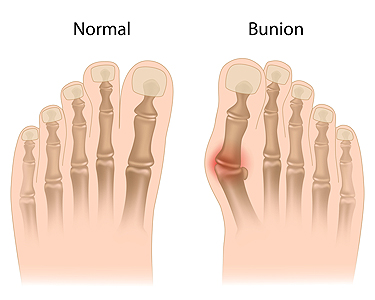 A bunion is a noticeable foot condition that consists of a hard lump on the side of the big toe. It can cause the big toe to point toward the other toes, and larger shoes may need to be purchased for maximum comfort. Bunions can form due to genetic reasons, in addition to wearing shoes that do not have adequate room for the toes to move freely in. Some of the symptoms that are associated with bunions include general pain on the bottom or side of the foot, and the affected area may appear red and swollen. Some patients find mild relief when a protective pad is worn over the bunion, and this may be helpful in diminishing a portion of the swelling. If you have developed a bunion, it is suggested that you consult with a podiatrist who can discuss surgery for permanent removal for severe bunions.
A bunion is a noticeable foot condition that consists of a hard lump on the side of the big toe. It can cause the big toe to point toward the other toes, and larger shoes may need to be purchased for maximum comfort. Bunions can form due to genetic reasons, in addition to wearing shoes that do not have adequate room for the toes to move freely in. Some of the symptoms that are associated with bunions include general pain on the bottom or side of the foot, and the affected area may appear red and swollen. Some patients find mild relief when a protective pad is worn over the bunion, and this may be helpful in diminishing a portion of the swelling. If you have developed a bunion, it is suggested that you consult with a podiatrist who can discuss surgery for permanent removal for severe bunions.
If you are suffering from bunions, contact the foot specialists of Certified Foot Care. Our doctors can provide the care you need to keep you pain-free and on your feet.
What Is a Bunion?
A bunion is formed of swollen tissue or an enlargement of boney growth, usually located at the base joint of the toe that connects to the foot. The swelling occurs due to the bones in the big toe shifting inward, which impacts the other toes of the foot. This causes the area around the base of the big toe to become inflamed and painful.
Why Do Bunions Form?
Genetics – Susceptibility to bunions are often hereditary
Stress on the feet – Poorly fitted and uncomfortable footwear that places stress on feet, such as heels, can worsen existing bunions
How Are Bunions Diagnosed?
Doctors often perform two tests – blood tests and x-rays – when trying to diagnose bunions, especially in the early stages of development. Blood tests help determine if the foot pain is being caused by something else, such as arthritis, while x-rays provide a clear picture of your bone structure to your doctor.
How Are Bunions Treated?
- Refrain from wearing heels or similar shoes that cause discomfort
- Select wider shoes that can provide more comfort and reduce pain
- Anti-inflammatory and pain management drugs
- Orthotics or foot inserts
- Surgery
If you have any questions, please feel free to contact our offices located in Larchmont and Brooklyn, NY . We offer the newest diagnostic and treatment technologies for all your foot care needs.
